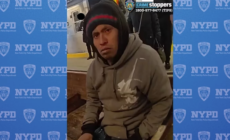-
The IRS might be dropping $1,400 into your stocking this year - 17 mins ago
-
Phillies Likely To Hold Onto Alec Bohm Following Jesús Luzardo Trade - 27 mins ago
-
How Airlines Pick the Movies on Your Flights - 48 mins ago
-
Two injured in crash of small plane on Carson golf course - 58 mins ago
-
Mets Could Lose $152 Million Pete Alonso To Dark Horse Rangers - about 1 hour ago
-
Campus Groups Try to Make Room for Middle-Ground Opinions on the Middle East - 2 hours ago
-
Padres, Rays Fan Favorite Wil Myers Announces Sudden Retirement At 34 - 2 hours ago
-
Suspect Caught After Setting Sleeping Woman Ablaze on NYC Subway - 2 hours ago
-
They Made Over $100,000 in Overtime. Now the N.Y.P.D. Is Cracking Down. - 2 hours ago
-
Bubba Wallace Reacts To Unexpected Support From Commanders’ QB Jayden Daniels - 3 hours ago
L.A. politician Ridley-Thomas’ final campaign: to clear his name

For more than three decades, Mark Ridley-Thomas never lost an election, tapping a well-organized network of supporters to secure victory after victory.
Now, the former Los Angeles City Council member and county supervisor is in a different sort of campaign with far greater stakes: a fight to clear his name and avoid prison.
The 70-year-old was convicted last year of seven federal corruption charges stemming from a scheme to secure benefits for his son from a USC social work dean who sought his political support for L.A. County business. The jury acquitted him of 12 other charges.
U.S. District Judge Dale S. Fischer sentenced Ridley-Thomas in August 2023 to 42 months in prison. The veteran lawmaker has been free on bail while he presses to have the jury verdict overturned by the U.S. 9th Circuit Court of Appeals.
On Thursday, Ridley-Thomas’ quest for vindication reaches a critical moment, with oral arguments scheduled before a three-judge panel at the Court of Appeals in Pasadena.
Ridley-Thomas and his supporters have approached his defense with the vigor and strategy of a political movement.
He has continued making public appearances, posing for photos alongside supporters and allies including L.A. Mayor Karen Bass. Mass emails keep supporters abreast of legal developments, with invitations to “RSVP” for hearings. “Our presence is our voice,” said one note calling for readers to pack the courtroom for Ridley-Thomas’ sentencing.
Ridley-Thomas has also turned to backers for financial help, writing in an April email, “We’ve got to be ready to turn this injustice around.” He asked for donations of $250 “or whatever you feel comfortable contributing.”
More than $100,000 flowed to his legal defense fund in the first half of 2024, according to a public filing.
Among his donors are familiar names in L.A. civic life: $1,000 each from lobbyist Arnie Berghoff, public affairs consultant Kerman Maddox, radio host Tavis Smiley and prominent lawyer Patricia Glaser. Fabian Nunez, the former state Assembly speaker, chipped in $2,500, according to the filing. A slew of former Ridley-Thomas aides also donated, including former Times journalist and now Capital & Main Editor in Chief Peter Hong with $200. Evitarus, a public opinion research firm, gave $5,000, according to the filing.
“I donated to the defense fund solely as an individual who once worked for Mr. Ridley-Thomas,” Hong said. “In our legal system we are entitled to mount a defense. Also in our system, we are expected to pay for that defense. That can be very expensive.”
Supporters have held prayer services, and in January, longtime aide Vincent Harris kicked off a “teach-in” where he and several lawyers walked through, in their view, deficiencies in the prosecution’s case.
At the teach-in, Areva Martin, an attorney and commentator, introduced the team of lawyers handling Ridley-Thomas’ appeal, singling out UC Berkeley Law School Dean Erwin Chemerinsky and Paul Watford, a former 9th Circuit judge now in private practice. Ridley-Thomas’ appellate case marks Watford’s first time appearing as a litigant before his former colleagues since he left the bench in 2023.
“Don’t think that he’s not been asked by lots of criminal defendants to take on their appeals,” Martin said at the teach-in. “The fact that he decided to take this case speaks volumes about what he thought about how this case was concluded at the trial level.”
“This case is unlike any other,” said Alyssa Bell, a former public defender who is leading the appeal team. “Our job is to retake the narrative, to retell the story from Dr. Ridley-Thomas’ vantage point and to make the world see the many ways in which the government took laws that never should have applied to these facts and contorted them to come up with a theory of prosecution that is the first of its kind.”
For much of the last year, prosecutors and defense have traded arguments in court filings that they will present Thursday to the three-judge panel. The defense has claimed that prosecutors constructed a “novel” theory of honest services fraud built around the idea that what Ridley-Thomas secured from his dealings with the USC dean was protecting his “public image” and “family brand.” The dean, Marilyn Flynn, was sentenced to 18 months of home confinement after pleading guilty to one count of bribery.
Honest services fraud doesn’t extend to quid pro quo exchanges where the “quid” is a perceived reputational benefit, defense attorneys argued in filings. They floated the idea that such a prosecution, if allowed to stand, would criminalize routine dealings between elected officials and constituents.
But prosecutors said they identified to jurors specific items of value in the bribery scheme that Ridley-Thomas allegedly sought to secure from USC: admission for his son Sebastian, a scholarship to cover Sebastian’s graduate studies, a teaching post for Sebastian and a $100,000 donation from USC to a nonprofit run by Sebastian, prosecutors wrote.
“Reputational benefit was merely one of defendant’s motives in soliciting and demanding benefits for his son,” prosecutors wrote, calling it “classic” corruption.
Both the prosecutors and defense attorneys had filed their briefs before the 9th Circuit in June when the U.S. Supreme Court issued a potentially disruptive ruling. By a 6-3 vote, the conservative majority overturned the conviction of a former Indiana mayor who took a $13,000 payment from a truck dealership that had received $1.1 million in city contracts.
In the ruling penned by Justice Brett M. Kavanaugh, the court found that officials could be prosecuted for bribery but not for accepting gratuities for past favors if there was no evidence of an illicit deal.
Ridley-Thomas’ lawyers had already accused prosecutors of conflating bribery and gratuities. The Supreme Court decision “makes clear” that the government’s theory of the case “was legally invalid as to all counts,” they argued.
Prosecutors fired back in a September filing, arguing that their case was consistent with the newer Supreme Court ruling because the evidence showed a clear quid pro quo agreement between Ridley-Thomas and the USC dean, including a confidential letter memorializing the agreement that the dean had hand-delivered to the politician’s downtown L.A. office.
Further, prosecutors accused Ridley-Thomas and his defense of cherry-picking from evidence to suit a convenient, if inaccurate, point of view.
“Much like he did in his opening and reply briefs, defendant advances a factual narrative divorced from the trial record,” prosecutors wrote.
Source link
















